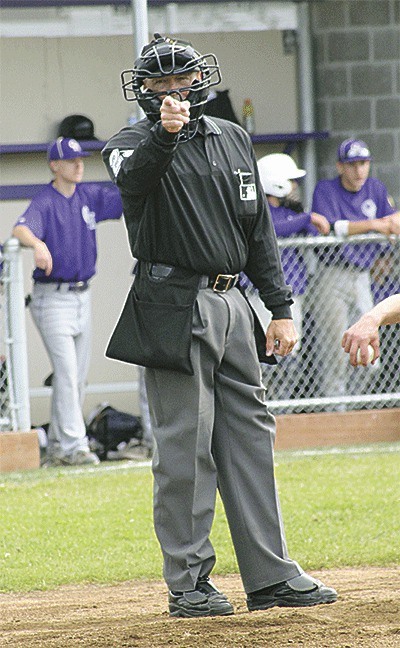This is a story about umpires.
Boooooo!
Just the mention of umpires elicits a negative response among fans. Few professions receive less respect than Rodney Dangerfield.
Some consider umpires a necessary evil. In reality, they are simply necessary – unbiased arbitrators to ensure a fair contest. They are willing to take the abuse that comes with making a close call – a decision half those involved think is an outrage.
Oak Harbor is the home of two of the region’s leading umpires, Jim Shulock and Tim O’Brien.
Shulock began umpiring during his college baseball- playing days at the University of Florida in 1974, maybe because he has it in his blood. His father was a professional umpire and his brother John umpired for many years in the major leagues.
After college he continued to umpire where he was stationed by the Navy, coming to Oak Harbor in the mid-90s.
He was named the Washington State High School Umpire of the Year in 2007. He was selected to work in the 2007 and 2011 state 3A and 4A tournaments, and is sought out for community college and Division II and III college games, as well as for the West Coast League (college summer league).
Shulock has also filled in when needed for professional spring training games in Arizona.
One of the highlights of his career, he said, was working home plate at Safeco Field during the state high school championship game. There he stood “in the exact same spot that my brother had earlier ejected Lou Pinella during a Mariners’ game.”
O’Brien started in 1994 while coaching for North Whidbey Little League. He worked up to Babe Ruth baseball and then high school, where he was already officiating football and basketball games.
He, too, has been selected to work district, regional and state high school games, and in the West Coast League. In addition, he has worked state and regional Babe Ruth contests and the Palouse Summer Series at Washington State University.
So why do it? Why take on a chore that invites criticism?
Shulock said, “I got into umpiring mostly because I love the game of baseball and I felt that I could do a better job than those I had umpiring the games I played in. Later it became a matter of pride in getting the call right and making sure the game was played fair and in the pure form it was intended.”
O’Brien became involved for several reasons, including a love for the “rules aspect of the game” and the need for “quality officiating.”
“I pour my heart and soul into the season I’m officiating,” O’Brien said, “to provide the best product I can on the field of play.”
He also sees it as an avenue to spend time with his sons, who were involved in many sports: “Where else can you spend hours with your boys while teaching them how to deal with some pretty difficult situations and walk away with a smile on your face?”
Another reason, he said, was “as the body ages and we no longer can play at the level we desire, it is a way to stay deeply involved in the game and have an impact on the game.”
Shulock said the best way to handle the abuse officials receive is to “first consider the source and then the situation.”
He added, “You need to let the situation dictate what you can tolerate.”
Regardless, he said, “I make it a point to have a line that won’t be crossed, and if it is, I will eject the offender. No umpire should be threatened or verbally abused.”
O’Brien agreed that it is important to take each situation individually and “not carry a chip on your shoulder from game to game.”
Both said much of the abuse from fans comes from a lack of knowledge of the rules or understanding of the game.
Shulock said fans should read the rule book and an umpire’s mechanic manual before deciding to judge: “Don’t think that what you see on TV in a major league baseball game pertains to youth baseball.”
O’Brien said, “In a game between two teams, there is always a third team on the field, and they are the only ones that have no stake in the outcome.”
Both said one of the positives of umpiring is the comradeship of fellow umpires.
Shulock said another postiive is giving the coaches, players and fans “a good game.”
“It is definitely not the money, travel, broken bones, concussions, bad fans and bad baseball,” he said.
O’Brien said, “I find working a game hard and hustling to be in the right position on calls the most rewarding part of the game.”
“Once you join the officiating side of sports,” he said, “you look at all contests from a completely different perspective.”
Area associations, O’Brien said, are always looking for new members who are “willing to work hard and become part of a great group of hard working professionals.”
“The hours and travel can be long and the income may have you break even,” he said, “but if you enjoy the game of baseball, there is no better way to stay involved and maintain your current job.”
Or to be right 50 percent of the time.



